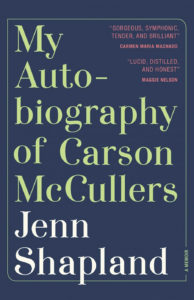According to Jenn Shapland, the problem with biographies of authors is that they fix the author in time and place. Layering on the biographer’s understanding of the author’s body of work, there is no room for readers to reach a different conclusion.

In Shapland’s magnificent My Autobiography of Carson McCullers, she addresses this very issue. Shapland notes that every time we read a book our conclusions can shift.
“In practice,” she says, “we are constantly revising the stories we tell about authors’ lives and what they sought to communicate in their work.”
Shapland, while working as an intern at the Harry Ransom Center, discovered love letters between McCullers and another woman. This set her on both a personal journey to come out as a lesbian and also to understand McCullers differently from how other biographers had described the beloved author of The Heart Is a Lonely Hunter and The Member of the Wedding.
There is much evidence to suggest that McCullers’s queerness was airbrushed by her biographers. She married her husband — twice. Much of her correspondence was destroyed. But what Shapland recovered from various archives confirmed McCullers’s love for women.
Shapland’s book is unique. Short chapters — some only a sentence long — describe her journey of both self-discovery and discovery about McCullers. Her work is more autobiography than biography, though she does draw parallels between herself and McCullers. They are both queer writers with chronic illness. Shapland lives in McCullers’s house in North Carolina for a month, noticing how the furniture is changed to suit those who wished to alter the earlier author’s aesthetic. Shapland receives a residency to write at Yaddo, like McCullers did, and walks in the same woods, searching for inspiration.
What makes this work so special is how it takes literature and makes it a journey of the heart. Shapland reminds us why reading is important. We come to a better understanding of who we are when we make literature a regular part of our lives. But most of all, we can have a symbiotic relationship with authors — even those who are no longer with us — as their books shape us, and we, in turn, shape their meaning.
Jennifer Wertkin is director of the Wellfleet Public Library.



